Text

Komodo Dragon
9K notes
·
View notes
Photo




It’s been hard enough keeping this place afloat by myself. Without you—
811 notes
·
View notes
Text
Something I try to keep in mind when making art that looks vintage is keeping a limited color pallette. Digital art gives you a very wide, Crisp scope of colors, whereas traditional art-- especially older traditional art-- had a very limited and sometimes dulled use of color.
This is a modern riso ink swatch, but still you find a similar and limited selection of colors to mix with. (Mixing digitally as to emulate the layering of ink riso would be coloring on Multiply, and layering on top of eachother 👉)

If you find some old prints, take a closer look and see if you can tell what colors they used and which ones they layered... a lot of the time you'll find yellow as a base!
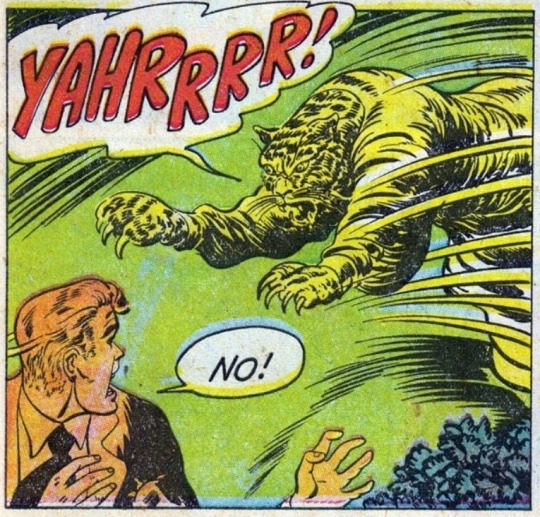
Misprints can really reveal what colors were used and where, I love misprints...
Something else I keep in the back of my mind is: how the human eye perceives color on paper vs. a screen. Ink and paint soaks into paper, it bleeds, stains, fades over time, smears, ect... the history of a piece can show in physical wear. What kind of history do you want to emulate? Misprinted? Stained? Kept as clean as possible, but unable to escape the bluing damages of the sun? It's one of my favorite things about making vintage art. Making it imperfect!

You can see the bleed, the wobble of the lines on the rug, the fading, the dirt... beautiful!!
Thinking in terms of traditional-method art while drawing digital can help open avenues to achieving that genuine, vintage look!
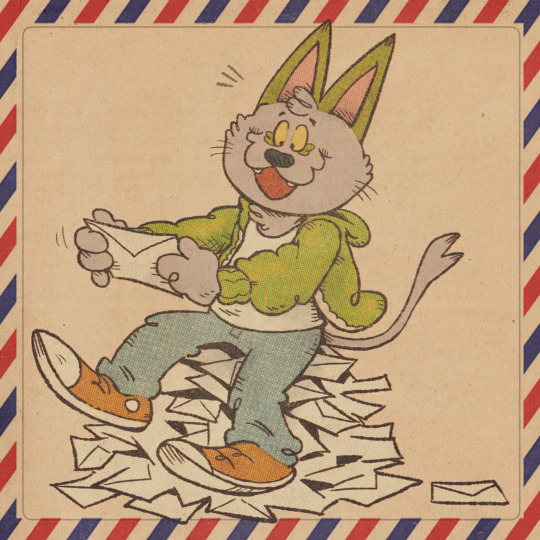


65K notes
·
View notes
Text
The original version of this story appeared in Quanta Magazine.
Scott Bolton’s first encounter with Io took place in the summer of 1980, right after he graduated from college and started a job at NASA. The Voyager 1 spacecraft had flown past this moon of Jupiter, catching the first glimpse of active volcanism on a world other than Earth. Umbrella-shaped outbursts of magmatic matter rocketed into space from all over Io’s surface. “They looked amazingly beautiful,” said Bolton, who is now based at the Southwest Research Institute in Texas. “It was like an artist drew it. I was amazed at how exotic it looked compared to our moon.”
Scientists like Bolton have been trying to understand Io’s exuberant volcanism ever since. A leading theory has been that just below the moon’s crust hides a global magma ocean, a vast contiguous cache of liquid rock. This theory dovetails neatly with several observations, including ones showing a roughly uniform distribution of Io’s volcanoes, which seem to be tapping the same omnipresent, hellish source of melt.
But now, it appears that Io’s hell has vanished—or rather, it was never there to begin with. During recent flybys of the volcanic moon by NASA’s Juno spacecraft, scientists measured Io’s gravitational effect on Juno, using the spacecraft’s tiniest wobbles to determine the moon’s mass distribution and therefore its internal structure. The scientists reported in Nature that nothing significant is sloshing about just beneath Io’s crust.
“There is no shallow ocean,” said Bolton, who leads the Juno mission.
Independent scientists can find no fault with the study. “The results and the work are totally solid and pretty convincing,” said Katherine de Kleer, a planetary scientist at the California Institute of Technology.
The data has reopened a mystery that spills over into other rocky worlds. Io’s volcanism is powered by a gravity-driven mechanism called tidal heating, which melts the rock into magma that erupts from the surface. Whereas Io is the poster child for this mechanism, tidal heating also heats many other worlds, including Io’s neighbor, the icy moon Europa, where the heat is thought to sustain a subterranean saltwater ocean. NASA launched the $5 billion Clipper spacecraft to search Europa’s sky for signs of life in the proposed underground ocean.
A map of Io’s surface, created with images from the Voyager 1 and Galileo missions, shows the wide distribution of the moon’s volcanoes. The large red ring is sulfurous fallout from the plume of the Pele volcano. Photograph: US Geological Survey
But if Io doesn’t have a magma ocean, what might that mean for Europa? And, scientists now wonder, how does tidal heating even work?
Melting Magma
Heat drives geology, the rocky foundation upon which everything else, from volcanic activity and atmospheric chemistry to biology, is built. Heat often comes from a planet’s formation and the decay of its radioactive elements. But smaller celestial objects like moons have only tiny reserves of such elements and of residual heat, and when those reserves run dry, their geological activity flatlines.
Or, at least, it should—but something appears to grant geologic life to small orbs throughout the solar system long after they should have geologically perished.
Io is the most flamboyant member of this puzzling club—a burnt-orange, crimson, and tawny Jackson Pollock painting. The discovery of its over-spilling cauldrons of lava is one of the most famous tales in planetary science, as they were predicted to exist before they were discovered.
NASA’s Voyager 1 probe photographed Io in 1979, revealing the first glimpse of volcanism beyond Earth. In this photo mosaic, a lava plume is seen emanating from Loki Patera, now known to be the moon’s largest volcano. Photograph: NASA/JPL/USGS
On March 2, 1979, a paper in Science ruminated on Io’s strange orbit. Because of the positions and orbits of neighboring moons, Io’s orbit is elliptical rather than circular. And when Io is closer to Jupiter, it experiences a stronger gravitational pull from the gas giant than when it is farther away. The study authors figured that Jupiter’s gravity must therefore be constantly kneading Io, pulling its surface up and down by up to 100 meters, and, per their calculations, generating a lot of frictional heat within it—a mechanism they described as “tidal heating.” They conjectured that Io may be the most intensely heated rocky body in the solar system. “One might speculate that widespread and recurrent surface volcanism would occur,” they wrote.
Just three days later, Voyager 1 flew by. An image taken on March 8 documented two gigantic plumes arching above its surface. After ruling out all other causes, NASA scientists concluded that Voyager had seen an alien world’s volcanic eruptions. They reported their discovery in Science that June, just three months after the prediction.
The planetary science community quickly coalesced around the idea that tidal heating within Io is responsible for the never-ending volcanism on the surface. “The unknown part that’s been an open question of decades is what that means for the interior structure,” said Mike Sori, a planetary geophysicist at Purdue University. Where is that tidal heating focused within Io, and just how much heat and melting is it generating?
Courtest of Mark Belan/Quanta Magazine
NASA’s Galileo spacecraft studied Jupiter and several of its moons around the turn of the millennium. One of its instruments was a magnetometer, and it picked up a peculiar magnetic field emanating from Io. The signal appeared to be coming from an electrically conductive fluid—a lot of fluid, in fact.
After years of study, scientists concluded in 2011 that Galileo had detected a global magma ocean just below Io’s crust. Whereas Earth’s mantle is mostly solid and plasticky, Io’s subsurface was thought to be filled with an ocean of liquid rock 50 kilometers thick, or almost five times thicker than the Pacific Ocean at its deepest point.
A similar magnetic field was coming from Europa, too—in this case, apparently generated by a vast ocean of salty water. The implications were profound: With a lot of rocky material, tidal heating can make oceans of magma. With plenty of ice, it can create oceans of potentially habitable liquid water.
Volcanic Vanishing Act
By the time the Juno spacecraft started swinging around Jupiter in 2016, the belief that Io had a magma ocean was widespread. But Bolton and his colleagues wanted to double-check.
A sequence of images taken over the course of eight minutes by NASA’s New Horizons probe in 2007 shows an eruption by the Tvashtar Paterae volcanic region. The plume in this false-color image rises 330 kilometers from the moon’s surface. Video: NASA/Johns Hopkins University Applied Physics Laboratory/Southwest Research Institute
During flybys in December 2023 and February 2024, Juno came within 1,500 kilometers of Io’s scorched surface. Although the remarkable images of active volcanoes drew everyone’s attention, the goal of these flybys was to find out if a magma ocean truly lay beneath the moon’s rocky skin.
To investigate, the team used an unlikely tool: Juno’s radio transponder, which communicates with Earth, sending and receiving signals. Because of Io’s unevenly distributed mass, its gravitational field isn’t perfectly symmetrical. That uneven gravitational field subtly alters the motion of Juno as it flies by, causing it to accelerate or decelerate a little.
That means Juno’s radio transmissions will experience the Doppler effect, where the wavelength shifts slightly in response to Io’s uneven gravitational field. By looking at the incredibly small shifts in the transmissions, Bolton’s team was able to create a high-fidelity picture of Io’s gravitational field and use that to determine its internal structure. “If there were indeed a global magma ocean, you’d see a lot more distortion as Io orbited around Jupiter and as the tidal forces flexed it and changed its shape,” said Ashley Davies, a volcanologist at NASA’s Jet Propulsion Laboratory who wasn’t involved with the new study.
But Bolton’s team did not find this level of distortion. Their conclusion was clear. “There cannot be a shallow magma ocean fueling the volcanoes,” said study coauthor Ryan Park, a Juno co-investigator at the Jet Propulsion Laboratory.
The Cassini-Huygens mission photographed Io against the backdrop of Jupiter in 2001. Photograph: NASA/JPL/University of Arizona
So what else might be powering Io’s volcanoes?
On Earth, discrete reservoirs of magma of different types—from the tarlike viscous matter that powers explosive eruptions to the runnier, honey-esque stuff that gushes out of some volcanoes—are located within the crust at various depths, all created by the interactions of tectonic plates, the moving jigsaw pieces that make up Earth’s surface. Io lacks plate tectonics and (perhaps) a diversity of magma types, but its crust may nevertheless be peppered with magma reservoirs. This was one of the original lines of thought until Galileo’s data convinced many of the magma ocean theory.
The new study doesn’t rule out a far deeper magma ocean. But that abyssal cache would have to be filled with magma so iron-rich and dense (because of its great depth) that it would struggle to migrate to the surface and power Io’s volcanism. “And at some depth, it becomes tricky to distinguish between what we would call a deep magma ocean versus a liquid core,” Park said.
For some, this raises an irreconcilable problem. Galileo’s magnetometer detected signs of a shallow magma ocean, but Juno gravity data has emphatically ruled that out. “People are not really disputing the magnetometer results, so you have to make that fit with everything else,” said Jani Radebaugh, a planetary geologist at Brigham Young University.
Researchers disagree on the best interpretation of the Galileo data. The magnetic signals “were taken as probably the best evidence for a magma ocean, but really they weren’t that strong,” said Francis Nimmo, a planetary scientist at the University of California, Santa Cruz, and a coauthor of the new study. The induction data couldn’t distinguish between a partly molten (but still solid) interior and a fully molten magma ocean, he said.
Heavy Water
Perhaps the main reason scientists study Io is because it teaches us about the fundamentals of tidal heating. Io’s tidal heating engine remains impressive—there’s clearly a lot of volcano-feeding magma being generated. But if it’s not producing a subsurface magma ocean, does that mean tidal heating doesn’t generate water oceans, either?
Scientists remain confident that it does. Nobody doubts that Saturn’s moon Enceladus, which is also tidally heated, contains an underground saltwater ocean; the Cassini spacecraft not only detected signs of its existence but directly sampled some of it erupting out of the moon’s South Pole. And although there is some light skepticism about whether Europa has an ocean, most scientists think it does.
The smooth, lightly scratched surface of Jupiter’s icy moon Europa, photographed by the Juno spacecraft in 2022, shows no sign of what lies beneath: in all likelihood, a vast saltwater ocean. Photograph: NASA/JPL-Caltech/SwRI/MSSS
Crucially, unlike Io’s odd magnetic field, which seemed to indicate that it concealed an ocean’s worth of fluid, Europa’s own Galileo-era magnetic signal remains robust. “It’s a pretty clean result at Europa,” said Robert Pappalardo, the Europa mission’s project scientist at the Jet Propulsion Laboratory. The icy moon is far enough from Jupiter and the intense plasma-flooded space environment of Io that Europa’s own magnetic induction signal “really sticks out.”
But if both moons are tidally heated, why does only Europa have an inner ocean? According to Nimmo, “there’s a fundamental difference between a liquid-water ocean and a magma ocean. The magma wants to escape; the water really doesn’t.” Liquid rock is less dense than solid rock, so it wants to rise and erupt quickly; the new study suggests that it doesn’t linger at depth long enough inside Io to form a massive, interconnected ocean. But liquid water is, unusually, denser than its solid icy form. “Liquid water is heavy, so it collects into an ocean,” Sori said.
“I think that’s the big-picture message from this paper,” Sori added. Tidal heating might struggle to create magma oceans. But on icy moons, it can easily make watery oceans due to the bizarrely low density of ice. And that suggests life has a multitude of potentially habitable environments throughout the solar system to call home.
Hell’s Poster Child
The revelation that Io is missing its shallow magma ocean underscores just how little is known about tidal heating. “We’ve never really understood where in Io’s interior the mantle is melting, how that mantle melt is getting to the surface,” de Kleer said.
Our own moon shows evidence of primeval tidal heating too. Its oldest crystals formed 4.51 billion years ago from the stream of molten matter that got blasted off Earth by a giant impact event. But a lot of lunar crystals seem to have formed from a second reservoir of molten rock 4.35 billion years ago. Where did that later magma come from?
Nimmo and coauthors offered one idea in a paper published in Nature in December: Maybe Earth’s moon was like Io. The moon was significantly closer to Earth back then, and the gravitational fields from the Earth and the sun were battling for control. At a certain threshold, when the gravitational influence of both were roughly equal, the moon might have temporarily adopted an elliptical orbit and gotten tidally heated by Earth’s gravitational kneading. Its interior might have remelted, causing a surprise secondary flourish of volcanism.
But exactly where within the moon’s interior its tidal heating was concentrated—and thus, where all that melting was happening—isn’t clear.
Perhaps if Io can be understood, so too can our moon—as well as several of the other satellites in our solar system with hidden tidal engines. For now, this volcanic orb remains maddeningly inscrutable. “Io’s a complicated beast,” Davies said. “The more we observe it, the more sophisticated the data and the analyses, the more puzzling it becomes.”
Original story reprinted with permission from Quanta Magazine, an editorially independent publication of the Simons Foundation whose mission is to enhance public understanding of science by covering research developments and trends in mathematics and the physical and life sciences.
2 notes
·
View notes
Text
I feel like age of sail tumblr might enjoy the point system/relative bearings as a writing resource.
You can describe a vessel's heading (where the bow is pointing) in relation to the points of the compass (so, North, North East, etc). Or in compass degrees numerically (the more modern method) (so, steering course 130 for instance).
But when you want to describe objects in relation to the boat itself, you use the relative bearing system to talk about where those objects exist in relation to the boat (as opposed to where they exist in relation to North/000). Usually this is done when you're standing watch as a lookout. So, like, "sail two points off the port bow" "buoy abaft the starboard beam" etc. (Beam means middle of the boat)
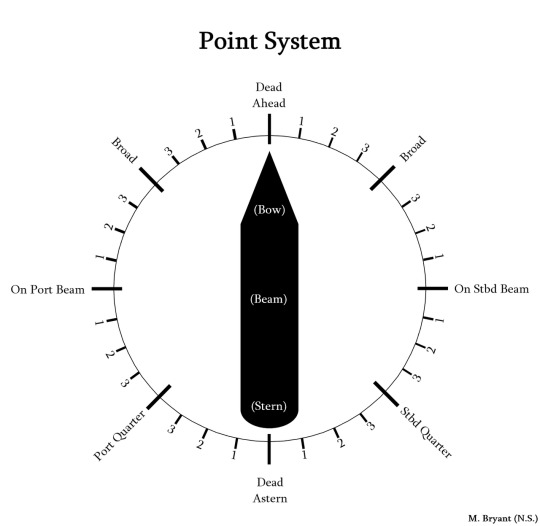
487 notes
·
View notes
Text
Most common sails

Square sail
The square sail is the oldest known sail. The Egyptians and Phoenicians were already familiar with it and the Vikings also used this type of sail. It has the shape of a square and is attached to a yard that is pulled up in the middle of the mast. This way the sail is perpendicular to the ship. Square sails need the wind in the direction of the course (diagonally from aft)
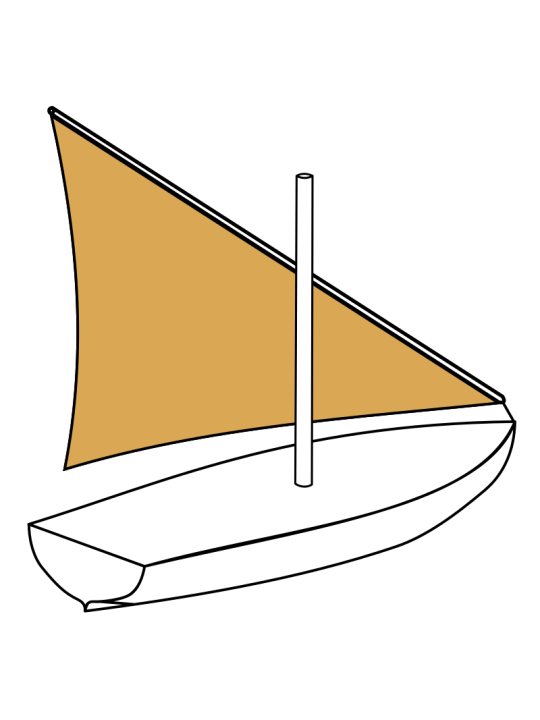
Lateen sail
The lateen sail has been known in Arab countries since the 1st century AD, and since the 8th century it has been the most common form of sail in the Mediterranean. It usually has a triangular shape, is sometimes also slightly trapezoidal and is attached to an inclined yard. This is almost twice the length of the mast. the latin sail can be longer than the ship itself. it was the first for and aft sail, i.e. a sail whose normal position is the longitudinal direction of the ship.
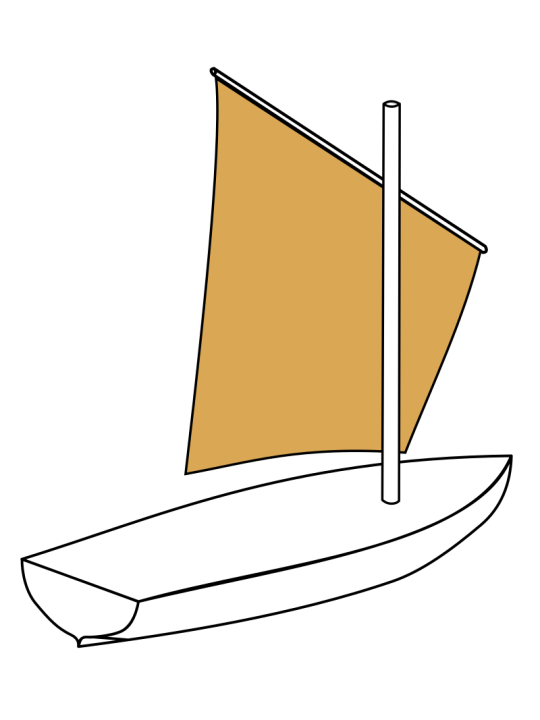
Lug sail
The origin of the lugsail is unknown. It has the shape of a square staysail, i.e. it is set lengthwise to the ship on a rather steeply set round timber. This in turn is offset to the side, loosely attached to the mast and considerably shorter than the lateen sail. The lugsail only needs one line to pull it up. It has proved to be particularly useful for dinghies, as it is uncomplicated and can be passed around the mast without having to haul in the sail first when tacking.

Gaff sail
Gaff rig is a sailing rig (configuration of sails, mast and stays) in which the sail is four-cornered, fore-and-aft rigged, controlled at its peak and, usually, its entire head by a spar (pole) called the gaff. Because of the size and shape of the sail, a gaff rig will have running backstays rather than permanent backstays. The gaff enables a fore-and-aft sail to be four sided, rather than triangular. A gaff rig typically carries 25 percent more sail than an equivalent Bermuda rig for a given hull design. A sail hoisted from a gaff is called a gaff-rigged (or, less commonly, gaff rigged or gaffrigged) sail.

Staysail
A staysail ("stays'l") is a fore-and-aft rigged sail whose luff can be affixed to a stay running forward (and most often but not always downwards) from a mast to the deck, the bowsprit, or to another mast. Most staysails are triangular; however, some are four-cornered. In square rigged ships the staysails can help in tacking, overcoming the lumbering square sails' tendency to prevent bearing up to windward, especially in light winds. Where a ship attempts to tack but fails and has to bear away again on the original tack, she is said to have missed her stays. In cutter rigged yachts the genoa will often need to be furled before changing tack due to the difficulty in passing the big sail between the two forestays. Here the staysail can help bring the bow through the wind more effectively.
In addition to providing more overall sailing force, a staysail can be used to modify a ship's sail plan to be more efficient in different types of weather. For example, in high winds a captain might reef a headsail, but that impacts the sail shape and can result in slower ship speed. Instead, the headsail could be furled entirely and a staysail used instead, resulting in higher ship speed.
426 notes
·
View notes
Text

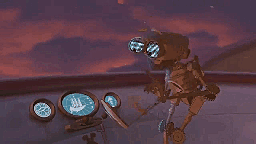
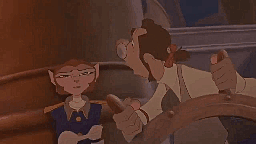

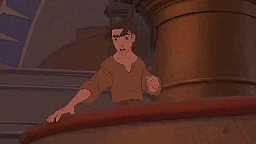
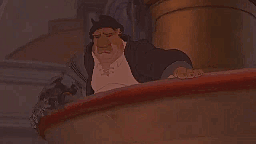
Treasure Planet (2002):
Jim saves the crew.
37 notes
·
View notes
Text
I bought a quarterly needlepoint magazine from 1991 today for $1 at an op shop, and there’s a four page spread about a woman who completely faithfully remakes samplers from the 1600s and the part that blows me away is that she was keeping women in history alive.
The original sampler maker was a teenaged girl called Loara she’s the only one known of seven siblings in that family. She was born approximately 1632 and had passed before her father had in 1656 which they know because it was mentioned in his will.
So in the 1630-40s a girl made a sampler, in 1991 a woman had put in years of research before recreating the sampler as Loara had 350 years earlier , and I’m reading about it in 2024.
Embroidery keeps women alive in history, and it’s part of why I love samplers so much.
Here’s a quote from samplers that I think about often:

13K notes
·
View notes
Photo



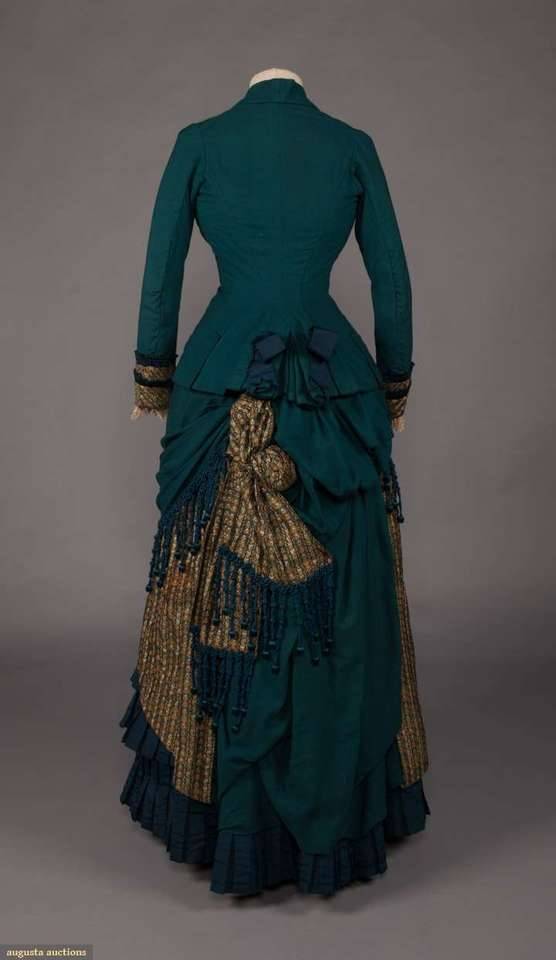

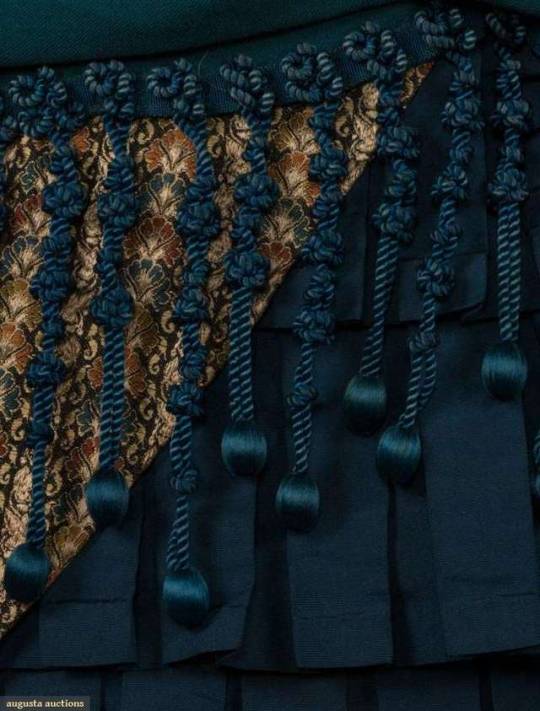

TEAL WOOL VISITING DRESS, c. 1880
2-pc teal wool & brocaded silk day dress with center front button closure, marine blue corded trim to bustled skirt,
3K notes
·
View notes
Text
Me: I'm going to look at horse forums, I bet the drama there is so funny
Me after 4 hours of horse forums: Damn....those people really love and care about their horses...
32K notes
·
View notes
Text
You guys want to see my 4x great grandparents house? It’s a beautiful 1850 stone house right on the West Virginia/Virginia border with an older log cabin on site. Current owners are trying to sell it as an Air BnB.
387 notes
·
View notes
Text
I've read "How to Invent Everything" and it's fantastic! Incidentally, Ryan North's work on the Fantastic Four is also.... well, I won't say it a third time ;)
I can understand how "modern person thrown into the past gets by pretending to be a healer/doctor" is as surprisingly common of a trope as it is. I mean I'm fluent enough at bullshitting to be pretty sure I could pull it off to impersonate a doctor in any time pre-1800s. If I have no idea what something is or how to treat it, I could just get the opinion of the other whatever-passes-as-medical-professionals around, but if their suggestions sound like bullshit I'm not doing it. And I'll beat the shit out of anyone suggesting bloodletting or mercury. With my healing stick. I've tied little bells on it, that jingle comically with every smack.
The awesome curative powers of my healing stick come from two separate sources: Placebo, and me using it to beat anyone trying to give my patients mercury.
47K notes
·
View notes
Note
I wanna hear these Opinions on steampunk color palettes, if you’re willing.
tbh “the Victorians did not go to the trouble of inventing aniline dyes so that we could wear neutrals” mostly covers it?
they went to a lot of effort to bring affordable screaming bright fuchsias and acid greens into the world, and we should honor their tacky, tacky choices.
70K notes
·
View notes
Text
yes and modern society as we know it is dependent on sanitation and clean environments. Public spaces literally cannot function without a janitor.
i think janitor should be the highest paying job in a society
182K notes
·
View notes
Text
Me: I'm going to look at horse forums, I bet the drama there is so funny
Me after 4 hours of horse forums: Damn....those people really love and care about their horses...
32K notes
·
View notes
Text
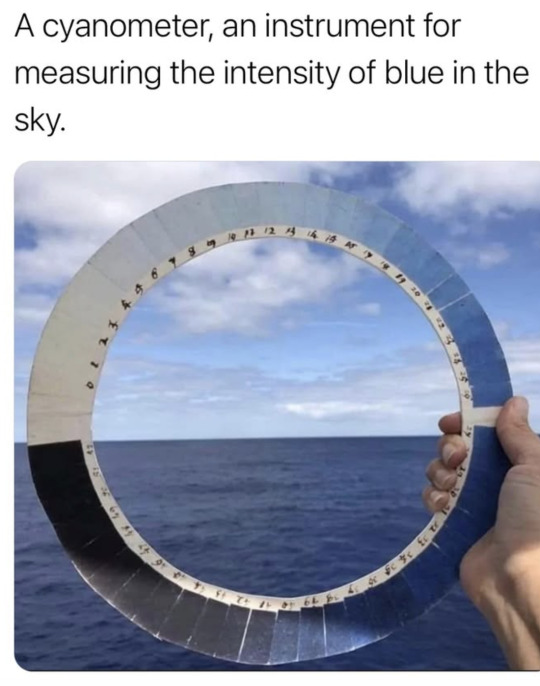
A cyanometer is a device used to measure the intensity of blue in the sky, often used in meteorology and atmospheric studies. It typically consists of a series of blue color patches or a color gradient, allowing the user to compare the sky’s color to these reference colors.
66K notes
·
View notes
Text
Resumption
Summary: when digging through storage under the ruins of the Benbow, Jim learns more about his past, and how it shapes his future.
Rating: PG for some swearing. No pairings.
This is an extremely rough draft that will be refined, revised and reposted. In most circumstances I would wait at least a month to post this while going through the revision progress, but this was written for the @jewsinfandoms prompt: Anniversary and the deadline is tonight, so.
Any criticism or commentary, especially about specific lines or passages, is always welcomed.
*
"I dunno, Jimmy," B.E.N. says, "It really, really doesn't look like there's much, uh, of anything left- unless you're into ashes and nails and-"
"No, you're right," Jim agrees, turning away from the ruins of the Benbow. Months of grey sunlight and grey rain had only served to leech the white from whatever ashes remained. Grey spars of wood and scorched metal lay in a twisted heap. "Mom and I already picked through it. But now that I think about it-"
He hopped the ruins of a railing and dropped a few feet into the ruins of the garden. "There was so much debris that fell over here, we didn't bother trying to get to the storage closet, but now that we've been hauling junk away-"
Jim stopped himself short for a second when he saw the scorch marks on the door. "-we might just find more junk."
"Shouldn't you get Mrs. H for this?" B.E.N. asked.
"I don't want to get her hopes up, y'know?" Jim said, testing the door latch. It ground on itself, and he peered at the mechanism. "Morph-" he began, but the protoplasm was already settling into his hand as a pair of forceps. "Thanks." He picked a few pieces of debris out of the latch, then gave it another push. It moved, but not without a screeching grind that made him wince. But the door opened with a burst of dust that set Jim and Morph coughing.
"Oh, can I get a look?" B.E.N. asked. Jim waved most of the dust away and surveyed the storage closet. Smaller than he remembered, and emptier. He can see some a can left over from the whitewash job they'd done on the inn a few yers back, and a few pieces of siding. The back of the space has some planks of te same woodused in the constructionof the inn leaning agaisnt the back wall.
"Just be careful- I'm hoping at least some of her china made in here over the years," he warned B.E.N.. The robot pulled his hand short of a box and moved his hand forward more carefully.
Jim checked the closest crate, knowing it would have his tools and materials for working on a solar surfer. He still breathed a sigh of relief when he saw everything was intact, if a bit rusted from the damp. "This would hve been a bitch to replace," he said, taking a wrench out of its drawer and rubbing it down with a clean corner of his shirt. Good tools were expensive and he had saved for months to afford these. Even with the treasure Silver had given them, it would have felt wrong to take even a sliver of the money. It was the least he owed his mom after everything. This crate he pushes back to the side of the door- he'd be taking this one home.
A glance over at B.E.N. shows that the navigational robot is engrossed in a bin of books, gently turning the brittle pages as he reads through a cookbook. Books are definitely the last thing they need at the Doppler house right now, so he lets that be.
The next crate surprises him with a swell of emotion-his old toys. He lifted out the most worn- a stuffed doll of a gap-toothed pirate with five tentacles. He remembered packing these away, fuming over he no longer remembered what, just that he was sick of people treating him like a kid. Of course, he had been a kid at the time, but it sure hadn't felt that way. He'll need to go through this box at some point- definitely when Mom isn't around, since she's probably the reason it ended up here and not in the rubbish- but it's not what he's looking for.
At his shoulder, Morph made a strange little sound, then entangled himself in the drooping cloth arms of the doll in his hands. With a trill, it peered out through the many-armed creature at Jim, enlargening its eyes pleadingly.
"Fine, fine, you can have this one," Jim said, and he's gentle when he puts it into the bag hanging from his waist. Morph makes a delighted sound a bit too much like a cackle and zips into the bag after it. This may be a mistake but that's a problem for future Jim.
Anotehr crate proves to be full of records- ledgers and columns written in his mom's steady cursive, and in a messier scrawl he doesn't have to recognize to identify. These he puts back, but at the bottom of the crate he comes across a packet of offical looking papers. Flipping through it, he recognized the courthouse seal and drawings that looked like an official survey. This he added to the bag- Mom was definitely going to need this when they started building the Inn again.
He remembers the next box, too. He had spent many long hours looking through his father's things, hoping against hope that there was some clue to his location, some secret key he could find that would bring him back. He had taken his dad's black jacket from it as a good luck charm- where had that old thing ended up, anyway?- but in the end, it was another foolish childhood dream. unlike Treasure Planet, this was the one he had outgrown for good.
After opening the top to confirm the contents, Jim pushed it to the side. He didn't need to go through that box. He had no need of anything in there. He was tempted to pawn the whole thing, but something held him back. Some of the things in there might be mom's, things Dad had given her that she couldn't bear to keep around but couldn't bear to throw away either. She deserved to make that final choice.
Morph floats out of his pocket and flies up to examine one of the rusted rifles leaning against to the walls. "Yeah, I don' think even I could fix that one, Morph," Jim said, rocking back on his heels as he gave the small space another once-over. "It's been too wet and too long." The only other things left in here was a pile of planks leaning against the back wall, but those were so old and mildewed that it was almost a pity they hadn't gone up in the fire.
"Too wet and too long!" Morph chirped, transforming into the blowfish creature he so liked to imitate.
"Oh, no you don't!" Jim started, reaching forward to scoop Morph up before he could get water all over the place, but the little protoplasm suddenly perked and darted to the back with an inquisitive trill, disappearing into a gap between the planks. A metallic clank echoes through the small space before Jim can call him back.
"Morph, careful!" Jim warns, squeezing past the crates he had just stacked to reach the pile of planks. Now that he's close, he can see the shape of- sometihng- hiding behind the planks. He takes them two at a time, laying them down carefully as he clears the planks away.
A chest- not a crate, a real, iron-bound wooden chest- the type of chest somene would take on an Etherium voyage. Had this always been here?" he strains his memory, and is able to come up with a vague memory of his dad telling him not to play in the planks. So probably not then.
There was a lock, but it hd brken into pieces. One of the wooden beams of the chest had caved in as well,a nd it was through here that Morph had suqeezed.
"Hey, be creful in there!" Jim said, hesitantly reaching to open the chest. THe hinges held, though they creaked like a oily stai. He stared down into some neatly wrapped cloth bundles. Morph had mused one of them up and was fussing at a dull grey mass.
Jim reached down and pulled back the cloth from the parcel. The smell hits- the sweet, pungent aroma of Pelsinor cinnamon, layered with other smells he doesn't recognize- before he realizes the object is on its side. He gingerly lifts it from the chest and turns it right side up- a small silver box, tarnished after years molding behind those planks. It's not larger than six inches on its longest side- it almost fits in his open hand. Something falls out of tiny holes on the top, and with another inpection Jim finds the little hingest. When he opens the lid, the smell gets even stronger. Definitely some kin of spices- but this is a very weird way to store them. And that smell…
It's not quite a memory. More an impression, but- that smell, and his mother's arms around him as she chants something- the words too far in meaning and pronunciation to call to mind.
He closes the box and puts it back in the cloth wrapping. Systematiclly, almost compulsively, he goes through the bundles, each piece more baffling than the last. Four seperate candlesticks, two a matched set, one nine-branched and curving, and another with a strangely wide and flat candle cup. A silver cup and platter wrapped in a linen cover embroidere with a six pointed rosette, a plate with six indentations, six little plaques with a three-pronged symbol and an empty compartment inside. All tarnished. At least that last one, he recognizes- the doc has some just like it affixed to his doorways in his house. He doesn't think he's seen the other stuff- or if he has, he idn't notice it.
"Hey, B.E.N.? What do ya make of this?" he asks the robot, who looks up from the pile of books he's digging through.
The robot scampers to his feet and peers at the collection. "Oh, we got stuff like this in the trove occasionally," he said, picking up the indented plate, "Not- all at once like this, mind, but bits and pieces at a time. It showed up in the darndest places, too- one time a yacht, another time a refugee ship, oh, and one time even a man 'o war. Yeah, and the captain of that was definitely a human like you." He scrutinized Jim. "Well, not exactly like you, cause you're here and he's, uh- well, never mind. I should put this back now. Actually, if you don't mind, I think I'm going to head back- I want to try this new bread recipe I found."
"Sure. But only three books," Jim says, examining the plaque a bit more closely. Huh, they opened up, but there was nothing inside.
"Only three?" B.E.N. pleaded, "But there's such a great collection here!"
"You can come back and read whenever you want," Jim promises, looking up, "But the last thing they need there is more books."
"Ok, fiiiiine," B.E.N. drawls, grabbing the top four books in his stack. Jim pretends he didn't notice, since once of those was Morph anyway, so it evened out.
As B.E.N. walked away reading, Jim peered back in the box, trying to decide what to do with it, when he saw there was one more thing, at the very bottm, that he had missed. A leather bound book, as wide as his forearm was long. He scooped it out of the bottom and blew the dust off before easing the cover open.
Some of the pages had stuck together, so he was on page seven or something, and on that page was a beautifully detailed rendering of a tree he's never seen, in various stages of its life cycle- from seedling, to sapling, then flower. A careful list in block letters down the side of the page lists the edible parts of the plant, the best times and places to harvest it, and a few medicinal uses.
Jim flips through the book in awe. Each picture is so detailed it's like he can reach through the page and collect whatever samples the artist had been working with. He lingers over one plant that he immediately recognizes from Silver's galley. That old cyborg, he bets, would know what at least half these plants were. Then, about halfway through the book, so small he almost misses it- a smudged date, a note in the same careful block print. "Morph," he says, peering at the tiny text, but the little shifter is already settlign into his outstretched hand as a glass lense.
Holdign it over the tiny text, he mouths, "Finally leaving this stinking planet today."
Was this his father's, then? Even as he thinks it, he knows it's not right. His dad liked working with his hands and hated sitting still- even something as simple as writing a letter made him ansty. Looking back now with the apathy his father deserved, he knows he would never have had the patience for something like this.
Only one other person in their family would have, and he flips through the next few pages. The dated entries remain, but always composed, laconic, as if the author felt like she was stealing space from the plants to put her own thoughts down. Did she not have a diary she could write in? Or maybe this was her diary, and at this point in her life the plants had been her priority. Either way, now he feels like he's intruding.
He flips to the end of the book to see if there's a final dated entry- and there is, only this one is much less composed and the parchment is stained.
Today's date, eight years past, looks back at him from a forlorn, empty page bearing nothing but the words "He's gone." in his mother's shaky cursive- the only cursive in the book.
That was today? Jim hadn't even noticed. It had used to be a day he obsessed over, a day he would spend ripping through the sky on his solar surfer or sneaking into the old quarry to explore the old shafts- anything to try and ease the pain of abandonment.
Jim traces the water stains with his fingers. He'd known she was suffering, of course. But for some reason, he'd never thought to think of his mother as a whole person unto herself with - desires, dreams- a future of her own that she wanted. She could have left him too, and this thought squeezes the breath from his lungs.
By thunder, he would have deserved it too, little shit that he'd been.
***
The sun is hanging low in the sky when they get back to Doctor Doppler's home. The tools he locks in the Doc's back shed. They'd need some oiling, some sanding, but he was relieved to get those back. He takes the box in himself, and plops it onto the dining room table. The sound of humming drifts in on the smell of baking bread from the kitchen and for the first time, Jim really looks at his mother- at the way her hair always slips out of its careful braided bun, at the slight tired droop to her eyes and the way the nerves stand out on her fingers. He knows it used to be worse- that she looks so much more at peace than he did before he found Treasure Planet, that she never used to hum in the kitchen. But still- how many of those lines on her face did he carve in with his thoughtlessness?
"Doc still working on his dissertation?" he asks, coming up beside her. She starts, almost dropping her ladle.
"Oh! Jim, you scared me. yes, he's shut in for heaven knows how long. Wash up, dinner's almost ready. B.E.N. has a surprise new bread recipe for dinner- he wouldn't even let me see." Mom pauses, then looks over at Jim, to make sure he's watching. "Go easy on him," she warns.
"I do!" he protested.
"He cares a lot about what you think. And he's trying really hard," Mom says, and to that he can't really argue. B.E.N. could follow a recipe- even adjust the ratio based on some formulas- but when it came to flavors and improvisation- well, he'd take his chances back on a Legacy full of pirates. "Could you set the table?"
"On it," he promised with a salute, and set the table for three just in case the doc did come down. But when he comes out of the washroom he sees Delbert coming down the stairs, looking a bit like a child caught stealing.
"Typical Delbert," Mom says, just as Delbert says, "I can explain!"
"-wait, explain what, Delbert?"
"Oh. So that wasn't about the bessamim and the- I mean, uh,-"
"Delbert," she says, "Out with it."
"I never pawned the silver!" He says, a bit panicked, "I know you told me to, but it just- it didn't feel right being your family heirlooms and all, and I just thought maybe sometime in the future-"
Silver. They must be talking about the stuff he'd found in storage.
"Silver?" she says, then recognition dawns in her eyes. "So if you didn't pawn the silver, then- where is it? and where did you get the money?"
"Well the money came from, uh, me," he says, "A loan, of sorts, just interest free. As for the silver why it's, uh, in storage under the Benbow. Or so I- so you didn't find it?"
"And you didn't keep it here-"
Both of them turn to look at Jim. "I was gonna ask," he said, "but then it was dinner time and I thought it could wait."
"It could have, it's just- not something I ever thought-" She takes a shaky breath. "I just thought it was all- melted down. Gone."
"What are they?" Jim asks, almost tentatively, and Delbert looks to Mom.
"…remember how," she said slowly, "we were the only family that didn't celebrate the Winter Solstice?"
"Well, yeah," Jim said, "We had to work, because everyone came to the inn to eat and we needed the money."
"No, I mean-" she pauses, looking a bit overwhelmed. "-they're ritual items," she tries again, "Like how all the miners here worship the Deepstone, we- I mean-"
Delbert snaps his fingers. "Mister Arrow," he said. "Remember how Mister Arrow would say a blessing after his meal? And how his meals had to be prepared seperately?"
Yes, that Jim remembered. Religion wasn't something he'd paid much mind to, before- on Montressor, a lot of miners worshipped the Deepstone or the Eternal Dark, and while Jim had plenty of dealings with miners, he'd never really bothered to consider what they got out of it.
"Why, it's more t'en just a give an' take, my laddie," Silver said in some surprise when Jim said as much. "T'ain't just about belief! It's about ya family!"
"So," Jim had said, "Just because your old man prays to some rock, you have to do it to?"
"Why, no," Silver had said, "it's about rememberin' where ya come from and honoring those who came before ye! The Eternal Dark is a story ya hears all over the Etherium- but it sure didnt start on Montressor! You know, before the mining, Montressor used to be known for her gardens!"
"For real?" Jim asked, raising a brow. A garden of purps, about the hardest things in the universe to kill, barely ,ade it through a mild acidic rain in Montressor's toxic soil.
"When I was a pup, they used to talk about such beautiful gardens," Silver sighed, looking out over the stars. "The tallest and lushest of trees, their bark every color o' the ether- some silver as meself, others as gold as a song, and flowers of blue so pretty it made the sapphires green with envy. But then the Empire found solarium in her soil, and started strip minin' er to death- and now, the only people talk about when they talk about Montressor, is those deep mines." Silver sighed. "I always wanted to see it, yknow. The gardens o' Montressor . I just never made it out this way, until signing on this here scientific voyage."
"I dunno," Jim says, "Seems like you'd still hear about it, if those gardens were such a big deal."
"Ah, ye would, would ye? Those amphibious gardners- they only lives about 20 years a generation. It's been nigh on sixty since the mining started. If none of them pass their cultural legacy on to their children, why, the gardens would really be dead then. Oh , sure, there's some pictures, some foreigner's description of what the gardens looklike. But if ye talk to one of them, I betcha there's so much more to it than any wild story you coul find out there."
"Maybe," Jim had said, still unconvinced.
But in the here and now-
"Yeah, I remember," he says. "So this- it's the cultural legacy of our family?"
"Well, of my family," Sarah says. "I left to marry your father. I never meant to leave it all behind but it just… well. It just turned out that way."
She meant he left her after she had left everything behind for him. And with debts to pay, a kid to raise-
She had been even more trapped on Montressor than he.
"And you," Jim turns to Delbert, remembering. "you have these- plaques on your doors. Just like the ones in the box, but you didn't have your meals set aside like Arrow-"
"Oh! Yes, well," Delbert squirmed. "I mean. There's as many different ways to be a Hebrew as there are stars in the sky- that is, I mean, sometimes I get caught up in my work and then I look up and oh! Shabbat's already started, so it's a bit late to get the candles out now, so then I-"
"It's not too late today, Delbert," Mom says suddenly. "No stars in the sky yet." There's a light in his mom's face he hasn't seen there since- since before his dad left, really. "We could-"
"well, why not? I'm due to get back in the swing of things- uh, do we have candles? What am I saying, of course I do- but where-"
Jim and his mom reached the cabinet at the same time. "I got it, mom," he assured her as he fished out the matches and candles from the top drawer, "You just- do your thing with the candles."
Delbert had alreay gotten the candlesticks- the pair- unwrapped and set out, along with the cup and the first plate that had been wrapped together. The smell of fresh bread grew even stronger as B.E.N. walked in from the kitchen, clutching a fresh sheet with a braided loaf on top. Sarah gasped, and her hands went to her mouth.
"What? I told you I tried a new recipe I found in one of your books, Mrs. H.," B.E.N. said, "Did I pick poorly?"
"No! B.E.N. you beautiful son of a gun!" said Delbert, "you picked perfectly!"
"Uh, I'm still- kinda lost here," Jim said.
"The braided bread like that is called challah," Mom said as she set the candles into the sticks, "it's a traditional recipe of our family." She took a shaky breath, and surveyed the room. Her eyes shone with unshed tears, a look he'd seen on her face so many times before- but this time, tears of joy.
"Better hurry, Sarah," Delbert advised, "There's a star peeking out."
"Every seventh day," Mom said, "we remember that God worked to create the universe, so we remember that day as a day apart from time and space- a day of rest. We light these candles, and-"
A bell rings, in the back of Jim's mind- her words, the same she'd once said to him so long ago "- we break this bread, and we drink this wine- to remember," he says with her.
But there's no time to ask, or confirm, because another star peeks out, and she moves right into the blessing over the candles. The chant is unfamiliar but those first three words- Baruch atah Adonai- send another shiver of familiarity down his spine.
If you had asked him this morning, he would have said that his family began and ended with his mother, and one old cyborg sailing out amongst the stars. But now- maybe he didn't just have a future. Maybe he had a past to anchor it to, also- to give it shape, structure. How can you know where you're going if you don't know where you've been?
Mom passes him the cup of wine, then a piece of the soft braided bread, reciting blessings as she does. The meaning completely passes him by, but the memory of doing this as a child- of giggling as she tore him an extra large piece of bread, of watching the candles radiate joy throughout the night-
And this, he remembers also, when Mom reaches her hand for his head. "This, at least," she murmurs, "I have done without fail, even if only in my prayers."
She speaks the same lilting language he does not know, but the meaning comes to him through memory- she must have blessed him, long ago, and translated-
May God bless you and keep you. May God's light shine upon you, and may God be gracious to you. May you feel God's Presence within you always, and may you find peace.
Peace he had found, or at least he had shed the pain of abandonment. And in that moment, he had never felt that light shining off him more strongly.
10 notes
·
View notes